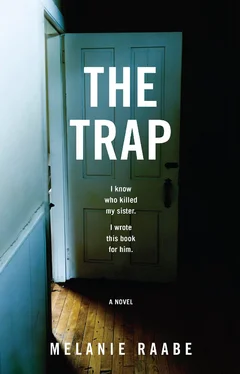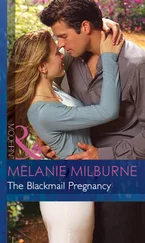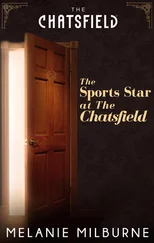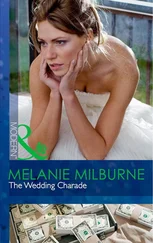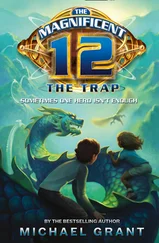When I hear footsteps, I jump. Billie’s stopped singing. At some point I must have silenced her sad voice with one of my many remote controls. Who’s there? It’s the middle of the night. Why doesn’t the dog bark? I want to drag myself out of bed, grab something I can use to defend myself with, hide, do something, but I lie there, my breathing shallow, my eyes wide open. Somebody knocks. I say nothing.
“Hello!” a voice calls out. I don’t recognize it. And then again. “Hello! Are you in there?”
The door opens. I whimper — my feeble version of a scream. It’s Charlotte, my assistant. Of course I recognize her voice. It was my fear that made it sound so strangely distorted. Charlotte comes twice a week to do my shopping, take my letters to the post office, do anything that needs doing. My paid link to the outside world.
Now she’s standing in the door, wavering. “Is everything all right?”
My thoughts rearrange themselves. It can’t be night if Charlotte’s here. I must have been lying in bed for a very long time.
“Sorry to burst in like that, but when I rang the bell and you didn’t answer I got worried and let myself in.”
The bell? I remember a ringing working its way into one of my dreams. I’m dreaming again after all these years!
“I feel a bit poorly,” I say. “I was fast asleep and didn’t hear you. I’m sorry.”
I’m ashamed of myself; I can’t even manage to sit up. Charlotte seems worried, although she’s not one to be easily flustered. That’s precisely why I chose her. Charlotte is younger than me, late twenties maybe. She has a lot of jobs — waitressing in several cafés, selling tickets at a cinema in town. Things like that. And twice a week she comes to me. I like Charlotte — her short hair that she dyes a bluish black, her sturdy figure, her flamboyant tattoos, her dirty sense of humour, the stories about her little boy. The cheeky devil, she calls him.
If Charlotte seems nervous, I must look terrible.
“Do you need anything? From the chemist or anywhere?”
“No thanks, I’ve got everything I need in the house,” I say.
I sound funny — like a robot. I can hear it, but I can’t do anything about it.
“I don’t need you today, Charlotte. I should have let you know. I’m sorry.”
“Not to worry. The shopping’s in the fridge. Shall I take the dog out, before I leave?”
Oh God, the dog. How long have I been lying here?
“That would be great,” I say. “Give him something to eat too, would you?”
“Sure.”
I pull the duvet up to my nose to signal that the conversation is over.
Charlotte hovers a little longer in the doorway, presumably uncertain about whether she can leave me alone. Then she makes up her mind and goes. I hear the sounds she makes in the kitchen as she feeds Bukowski. I usually love it when there are sounds in the house, but today it means nothing to me. I let the pillows and duvet and darkness engulf me, but I can’t get to sleep.
I lie in the dark, thinking about the blackest day of my life. I remember that I couldn’t grieve when my sister was carried to her grave — not straightaway. My head and body were bursting with one thought. Why? There was only room for one question: Why did she have to die?
I had the feeling that my parents were asking me this question — my parents, the other mourners, Anna’s friends and colleagues, practically everyone — because, after all, I’d been there; I must have seen something. What, for heaven’s sake, happened? Why did Anna have to die?
I remember the mourners crying, throwing flowers on the coffin, leaning on each other, blowing their noses. It all felt so unreal to me, so strangely warped — the sounds, the colors, even the feelings. A vicar who spoke in a strangely drawling voice. People moving in slow motion. Flower arrangements with roses and lilies — all monochrome.
Oh damn, the flowers! Thinking of the flowers catapults me back to the present. I sit up in bed. I forgot to ask Charlotte to water the flowers in the conservatory, and she’ll have left by now. Charlotte knows how much I love my flowers and she knows I usually look after them myself, so it’s unlikely she’ll have given them water. There’s nothing for it but to do it myself.
I get up, groaning. The floor is cool beneath my bare feet. I force myself to place one foot in front of the other, to walk along the hallway toward the stairs, go down to the ground floor, and cross the big sitting room and the dining room. I open the door to my conservatory and enter the jungle.
My house is dominated by empty spaces and dead objects — not counting Bukowski. But here in my conservatory, with its lush and rampant greenery, it’s life that reigns. Palms, ferns, passionflowers, birds of paradise, flamingo flowers and, above all, orchids. I love exotic plants.
The steamy heat of the conservatory, which I think of as my own little hothouse, brings out the sweat on my forehead almost immediately, and the long baggy T-shirt I wear as a nightie clings to me. I love this green jungle. I don’t want orderliness; I want chaos, life. I want the twigs and leaves to brush against me as if I were in a forest. I want to smell the scent of the flowers; I want to get drunk on it. I want to soak up the colors.
I look about me. I know that the sight of my plants should give me pleasure, but today I feel nothing. My conservatory is brightly lit, but outside it is night. Indifferent stars twinkle through the glass roof above my head. As if on autopilot, I carry out the tasks that usually give me so much satisfaction. I water the flowers. I touch the soil with my fingers, feeling if it’s dry and crumbly and needs water, or clings to my hands.
I clear a path for myself to the back of the greenhouse. This is where I have my own private orchid garden. The plants with their extravagant blooms are crammed onto shelves, or hang in pots from the ceiling. My favorite is here — my favorite and my problem child. It’s a small orchid, altogether unassuming alongside its lavishly flowering sisters, and almost ugly. It has only two or three dull, dark-green leaves and dry gray roots, no flowers, not for a long time now, not so much as a stalk. It’s the only plant I didn’t buy especially for the conservatory. I brought it with me from my old life, from the real world, many, many years ago. I know that it will never flower, but I can’t bring myself to get rid of it. I give it some water. Then I turn my attention to a particularly beautiful orchid with heavy white flowers. I let my hand glide over the leaves, finger its velvety flowers. The buds are firm to the touch. They are bursting with life. Not long now until they come out. I think how nice it would be to cut a few of these flowering stems and put them in a vase in the house. And, while I’m thinking all this, I’m reminded of Anna again. Even in here, I can’t get her out of my head.
When we were little, she didn’t like picking flowers as much as I did, or as much as the other children. She thought it was mean to break off their beautiful heads. A smile steals over my lips as I think of it now. Anna’s quirks. I see my sister before me quite clearly — her blonde hair, her cornflower-blue eyes, her tiny nose, her enormous mouth, the furrow between her pale eyebrows that would appear whenever she got cross. The small moles that formed a perfect triangle on her left cheek. The blonde down only visible if the summer sun lit up her face at the right angle. I see her quite plainly. And I hear her voice, clear as a bell, and her dirty, boyish laugh that contrasted so starkly with her feminine nature. I see her before me, laughing, and it’s like being punched in the stomach.
I think back to one of the first sessions with my therapist, shortly after Anna’s death. The police had no clues, and the identikit picture they’d assembled with my help was useless. Even I didn’t think it looked much like the man I’d seen. But, no matter how hard I tried, I couldn’t do any better. I remember saying to the therapist that I had to know why this had happened — that the uncertainty was a torment to me. I remember her telling me that it was normal, that not knowing was always the worst thing for the relatives. She recommended a self-help group to me. A self-help group — it was almost laughable. I remember that I said I’d do anything, if I could find out the reason. That much at least I owed to my sister. That much at least.
Читать дальше
